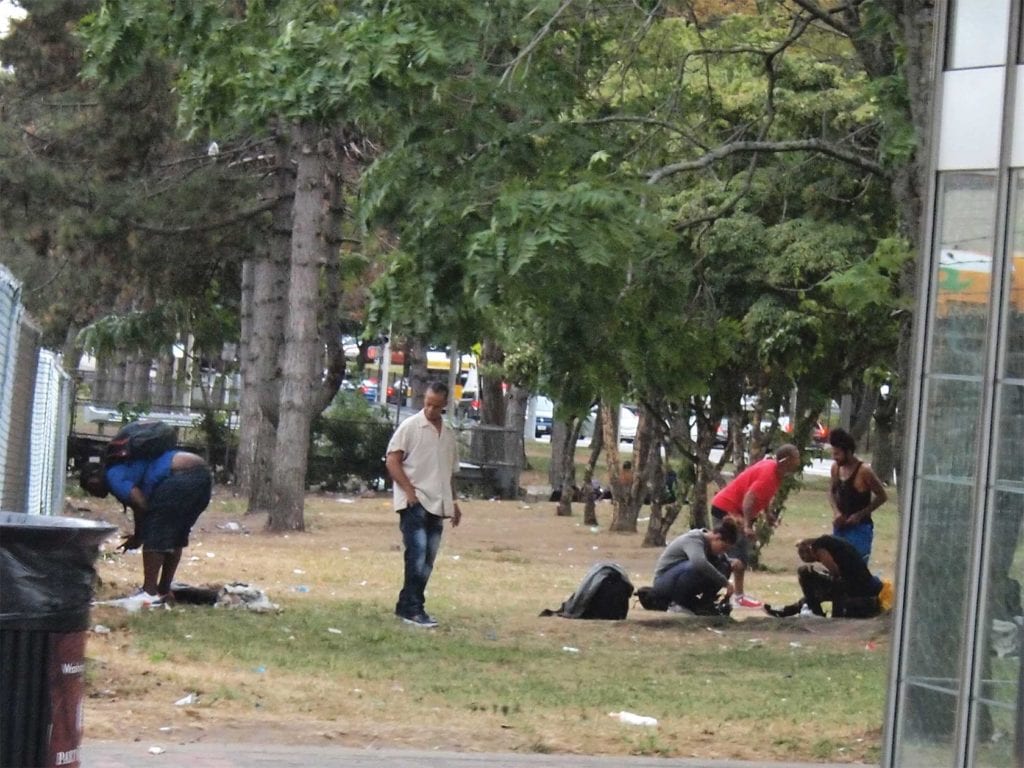
Months after a controversial police sweep of the streets around Melnea Cass Boulevard and Massachusetts Avenue pushed the city’s concentration of drug users into the surrounding South End and Roxbury neighborhoods, city officials announced a Mass and Cass 2.0 plan to mitigate the impacts of the homeless encampments, discarded needles and other public nuisances while continuing to provide services.
The city will increase the number of police officers trained in outreach to the substance-abusing population in the area and double the number of people working on the Mobile Sharps Team from four to eight in an effort to collect more discarded needles from city parks, playgrounds and streets.
Health and Human Services Chief Marty Martinez told reporters the city’s new plan calls for a higher degree of coordination and communication between the discrete components of the city’s response to the opiate crisis that has become highly visible around the Mass and Cass area. A concentration of methadone programs and other services in the area has attracted users from across Massachusetts and from neighboring states.
“It’s called for us to strike the right balance between public health, public safety and quality of life while focusing on coordination of services, alignment of services and improved communications,” Martinez said of the new plan.
A critical component of the city’s response to the substance abuse crisis involves increased street-level outreach. The city received $750,000 in funding from the Massachusetts Executive Office of Health and Human Services to increase outreach and for the Mobile Sharps Team.
As part of the city’s expanded efforts, Clifford Park will be swept for needles daily. Wood chips in local parks and playgrounds will be replaced with new safety surfacing.
Martinez said the city has spent $64 million responding to the opiate crisis since 2014.
In a statement to news media, Mayor Martin Walsh said the city remains committed to providing services to those addicted to drugs while at the same time protecting neighborhoods from the crime associated with drug abuse.
“There is not one perfect solution to dealing with this crisis, but we are committed to doing everything we can,” Walsh said. “Our primary focus will always be on the safety and wellbeing of all people in the City of Boston, and I’m asking for us all to work together hand in hand as a community to confront this national crisis.”
Beyond Mass and Cass
The city also is looking to expand services outside of the Massachusetts Avenue and Melnea Cass Boulevard area.
“We’re really invested in looking at where can we provide other services outside of this immediate area that will help people get their needs met,” Martinez said. “In this area, Melnea Cass and Mass. Ave., this is the epicenter of what we’re seeing. But the substance use disorder epidemic is hitting every neighborhood in Boston, is in every corner of every neighborhood.”
Clean Sweep II?
Police are not planning another Operation Clean Sweep. The controversial police action came after an off-duty corrections officer was assaulted by a group of people in an area outside the South Bay House of Correction that is frequented by drug users.
Police moved aggressively to clear the area, making dozens of arrests and pushing the population deeper into the nearby South End and Dudley Square areas.
Encampments
Police are actively working to dismantle homeless encampments. Boston Police Deputy Superintendent Michael Stratton said the department’s outreach officers will not dismantle the camps immediately, but will instead focus on shelter and services for the people living in the camps. Stratton said the process can take several days.
Greater engagement
City officials plan to increase engagement with individuals suffering from drug addiction. Currently, the city is engaging 250 unique individuals per month through its outreach workers. Martinez said the city is boosting the number of outreach workers on the street to 14 and will increase the number of people reached on the street.
Long-term plan
The city is still committed to rebuilding the bridge to the Long Island shelter. Boston officials are planning on re-opening substance abuse treatment facilities there. The move could greatly expand the number of treatment beds available in the area. Boston officials are currently seeking permits for the construction project from the city of Quincy, which abuts the Boston-owned Long Island Bridge. Quincy officials have been resistant to the city’s efforts to rebuild the bridge, citing concerns about the impacts of construction on the residential neighborhoods trucks would travel through to reach the bridge.


![Banner [Virtual] Art Gallery](https://baystatebanner.com/wp-content/uploads/2024/04/Cagen-Luse_Men-at-store-e1713991226112-150x150.jpg)



